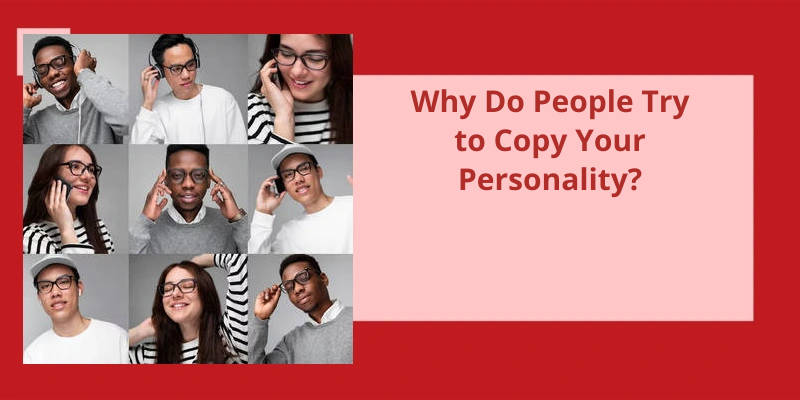It's a question that’s confounded many individuals who find themselves in the peculiar situation of having someone mimic their every move, style, and mannerism. But the motivations behind such behavior can be complex and varied. On one hand, there are those who view you as a role model and strive to emulate your personality as a way to honor and admire you. They believe that by adopting your ways, they can achieve the same level of success, popularity, or happiness that you enjoy. On the other hand, there are those who may see the act of copying as a means to gain attention and benefits that they perceive you’re receiving. This could be a close friend or acquaintance who believes that by becoming a better version of you, they can bask in the same admiration and popularity. In some cases, the desire to copy your personality may stem from a deep longing to be closer to you, to form a stronger bond and create a stronger connection. Whatever the reasons may be, it’s undoubtedly an intriguing and sometimes perplexing phenomenon that sheds light on the complexities of human behavior and the power of influence.
Is Copying a Form of Jealousy?
Why do people try to copy your personality? It’s a question that many have pondered and perhaps experienced firsthand. Is copying a form of jealousy? When individuals witness someone possessing a certain look, talent, or idea that they lack, they may become envious to the point where they try to imitate that persons successes and incorporate them into their own lives. It’s a seemingly pathetic, upsetting, and unfortunate behavior, one that arises from a feeling of inadequacy and an inability to find their own unique identity.
The act of emulation, though often irritating and invasive, can also stem from a genuine admiration for someones qualities. People may be drawn to specific personality traits or skills that they perceive as attractive or desirable, such as confidence, charisma, or creativity. Wanting to be more like someone you admire is a natural response. However, when such admiration turns into a compulsive need to replicate every aspect of another persons character, it crosses the line into obsession and can undoubtedly be seen as a form of jealousy.
It can also result from a genuine admiration for someones attributes, albeit taken to an extreme. Insecurity, fear of rejection, and the desire for validation are psychological factors that may contribute to this behavior. While it remains a difficult behavior to control or eradicate completely, understanding it’s underlying causes and fostering self-acceptance and individuality can help mitigate the inclination to copy others.
How to Deal With People Who Copy Your Personality or Traits
- Recognize and accept that imitation is a form of flattery
- Focus on honing your unique qualities and strengths
- Avoid reacting negatively or confrontationally
- Find ways to differentiate yourself
- Set boundaries and assert your individuality politely
- Cultivate genuine connections and meaningful relationships
- Strive for personal growth and continue to evolve
- Embrace your own authenticity and self-confidence
- Seek support from trusted friends or mentors
- Lead by example and inspire others to find their own identity
When it comes to the psychology behind copying, it’s often linked to conformity. A fascinating study emphasizes that individuals tend to distance themselves from an object or idea they’ve already attained when they perceive it’s uniqueness to be diminished. Understanding the motivations behind this behavior can shed light on why people may engage in copying behaviors and the underlying psychological processes that drive them.
What Is the Psychology Behind Copying?
The psychology behind copying can be quite complex, as it encompasses various factors such as conformity, social influence, and the human need for acceptance and belonging. When individuals try to copy someone elses personality, it’s often driven by the desire to fit in or be perceived in a certain way. By emulating another persons behavior, style, or traits, individuals may hope to gain the same popularity, social status, or attention that the person they admire receives.
One aspect that contributes to this behavior is conformity, which refers to the tendency of individuals to adjust their beliefs, attitudes, and behaviors in order to match those of a group. People have an inherent need for acceptance and belonging, and conforming to the norms and behaviors of others can provide a sense of security and validation.
Research has shown that individuals often distance themselves from items they own if they perceive that their uniqueness or distinctiveness is being diminished.
By understanding these underlying motivations, we can gain insight into why people engage in this behavior and how it affects their sense of self and interactions with others.
The Impact of Advertising and Marketing on Copying Behavior
- The influence of advertising and marketing on consumer purchasing habits
- The effect of persuasive communication in encouraging certain buying behaviors
- The role of brand messaging in shaping consumer decision-making processes
- The impact of celebrity endorsements on consumer preferences and behaviors
- The use of emotional appeals in marketing campaigns and it’s impact on consumer copying behavior
- The influence of social media advertising on consumer copying behavior
- The power of product placement in shaping consumer preferences and influencing purchasing decisions
- The role of consumer testimonials and reviews in motivating others to copy certain behaviors
- The use of scarcity tactics in marketing to create a sense of urgency and influence copying behavior
- The impact of cultural and societal norms on consumer copying behavior and the role of advertising and marketing in reinforcing or challenging these norms
- The ethical considerations surrounding the use of persuasive techniques in advertising and marketing
Recent research has shed light on the psychology behind the act of copying someone. Two prominent psychologists, Bargh and his colleagues, delved into this phenomenon and discovered that individuals with higher levels of empathy are more inclined to imitate others. The capacity for genuine empathy enables individuals to establish profound connections and pay closer attention to those they interact with, ultimately increasing the likelihood of mimicry.
What Is the Psychology Behind Copying Someone?
What drives people to copy someone elses personality? The psychology behind this intriguing phenomenon sheds light on our innate tendencies and social dynamics. It was John Bargh and Tanya Chartrand, two psychologists who were the first to explore and delve into this topic. They discovered that genuinely empathetic individuals are more prone to imitate others compared to those who lack empathy.
Empathy plays a vital role in this process. When people possess a genuine sense of empathy, they pay heightened attention and form a deeper connection with the person they’re interacting with. This heightened attentiveness leads to an increased likelihood of mimicking the other persons behaviors, gestures, and even personality traits. It’s through this mimicry that empathetic individuals seek to establish rapport and connection with those around them.
There’s a primal instinct embedded within us to seek social acceptance and belonging, leading us to adopt the personalities, interests, and mannerisms of those we admire or wish to connect with. By mirroring someone elses personality, individuals hope to enhance their chances of being liked, accepted, and included within social groups.
Another underlying psychological mechanism that drives people to copy others is the concept of social influence. Humans are inherently social creatures, and we’re highly influenced by the behavior and actions of those around us. We often look to others as social cues for appropriate behavior and standards. When we witness someone with a charismatic or influential personality, we may feel compelled to mimic them in order to attain similar levels of success, power, or admiration.
Individuals may believe that emulating the traits and characteristics of successful or popular individuals will ultimately lead to their own personal growth and success. By adopting these desired qualities, they may hope to improve their own self-image and increase their chances of achieving their goals and aspirations.
It’s often driven by empathy, the desire for social acceptance and belonging, the influence of people around us, and the pursuit of self-enhancement. Understanding these underlying motivations can provide valuable insights into the complexity of human behavior and our inherent need for connection, growth, and identity.
The Consequences of Excessive Copying Behavior on Individuality and Authenticity
- Loss of personal identity
- Lack of originality
- Diminished creativity
- Inhibited personal growth
- Destruction of innovation
- Potential legal consequences
- Negative impact on self-esteem
- Difficulty in building meaningful relationships
- Reduced trust and credibility
- Stagnation of personal development
Conclusion
When it comes to the question of why people try to copy your personality, the answer is multifaceted. It may be a sign of admiration and aspiration, as they see you as their role model and strive to emulate your style to honor you. Alternatively, some individuals may seek to garner the same attention and benefits that you effortlessly attract. In the case of a close friend replicating your personality, it could be an attempt to become a more refined version of themselves or simply a way to feel closer to you. Regardless of the underlying motivation, this phenomenon underscores the power and influence that a person's personality can hold over others, highlighting the significance of one's authenticity and individuality.






